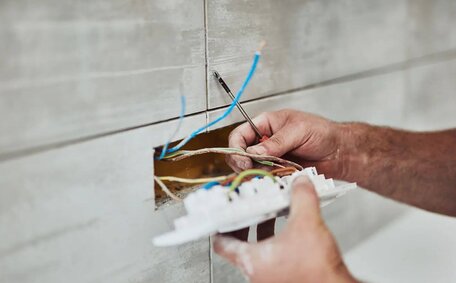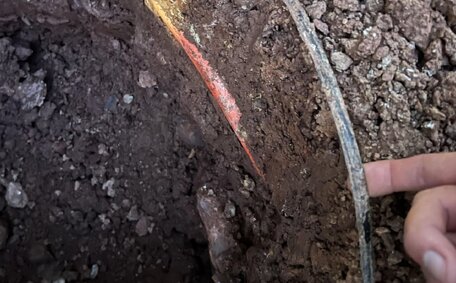Flickering lights, discoloured outlets, and buzzing switches might seem like small issues, but they often signal serious problems lurking in your home’s electrical system.
Ignoring electrical issues such as faulty wiring, poor installations, overloaded circuits, or failing components can result in fires, electrocution hazards, and expensive repairs.
We’ll delve into the most common visual and auditory signs of electrical faults and what they mean. You’ll discover what to watch for and when it’s crucial to call in an electrician to avoid disaster.
What is an Electrical Fault?
![2024 02 Fixing Faulty Wiring Fixing Faulty Wiring]()
An electrical fault arises when something disrupts the normal path of electricity. This often stems from damage within the wiring system, impeding the usual flow of current.
Some examples of common electrical faults include:
- Short circuits - wires connected incorrectly so current flows along an unintended path
- Broken wires or loose connections - gaps in wires or connectors that electricity has to jump across
- Overloads - too much current flowing through an undersized wire
- Damaged insulation - bare wires that electricity can leak from
- Water damage - moisture allowing unintended current flows
- Rodent damage - mice or rats chewing through wires
These types of electrical faults are hazardous as they can lead to voltage drops or spikes. The disruption in normal current flow can also produce excess heat build-up and fire risks. Faults need to be repaired by an electrician as soon as they are discovered to prevent more severe issues from developing.
Visual Signs You Have an Electrical Fault
Flickering Lights Reveal Damaged Electrical Wiring
Of all the visual cues signalling electrical faults, persistently flickering lights should give you the greatest cause for concern. Lights that constantly pulse or fluctuate likely indicate damaged electrical wiring or another electrical fault somewhere in your home’s electrical system.
The flickering may be constant or intermittent, affecting one light or multiple lights on the same electrical circuit. Older light bulbs may also flicker from age and filament degradation, so take note if the flickering only occurs in older bulbs.
What causes the flickering? Often, a loose wire connection or overloaded circuit is the culprit behind flickering lights. As wires heat up, expand, and lose contact, the power supply becomes inconsistent, making the lights flicker.
This overheating can lead to insulation melting, releasing toxic fumes into your home. Old wiring insulation may also have deteriorated, crossed circuits, or arced, leading to shorts and flickering lights. These conditions greatly increase fire risks.
![2024 02 Light Faults Light Faults]()
Discoloured Outlets and Switches Warn of Overloads
Take note if you see any outlets or switches in your home that are discoloured or appear burnt. The plastic on outlets and switches can change colour and become warm or melted if the wires behind them are overheating. This excessive heat build-up is frequently caused by overloading the circuit or outlet with more appliances and devices than the electrical systems were designed for.
An outlet that is brown, warped, or hot to the touch when in use likely has faulty wiring or another issue like electrical arcing leading to dangerous overheating. Discolouration near an outlet may signal moisture seeping into connections as well. Any of these conditions substantially increase the risks of electrocution and electrical fires.
Buzzing and Sizzling Signal Loose Connections
Hearing buzzing, humming, or sizzling from an outlet or switch is indeed a concern. These sounds usually arise due to electricity arcing across gaps in loose or faulty wiring. The buzzing often occurs as electricity leaps small gaps in unsafe connections.
This abnormal arcing can quickly lead to extremely high heat, sparks, and potential fires. The risk of catastrophic damage from arcing faults is severe, so call an electrician immediately if you hear these sounds.
Burning Smells Indicate Overheated Electrical Wires
Stop and take notice if you detect a burning odour resembling melting plastic or singed wood coming from an outlet. This likely means wires, insulation, or related components have become dangerously overheated from electrical current loads exceeding the circuit’s capacity.
The degradation of the insulation allows wires to touch and generate extreme heat. The burning can spread rapidly through walls and insulation. Overheating from high loads on the circuit, corrosion, or faulty appliances can be to blame. Regardless, a burning smell signals an urgent fire hazard.
Visual Signs of Problems with Electrical Appliances
Dangerous electrical faults don’t only occur in permanent wiring. Warning signs like flickering, a buzzing sound, and discolouration around cords and plugs can also indicate issues with electrical appliances like lamps, televisions, kitchen appliances, power tools, and more.
Closely inspect any appliance that repeatedly blows a fuse, circuit breaker trips, sparks, or gives off an electrical smell for damage. Frayed cords, cracked plugs, and loose connections can lead to electrical fires or make an appliance unsafe to operate.
Don’t Ignore These Signs of Lurking Electrical Fire Risks
Flickering lights, discoloured outlets, buzzing noises from switches, and burning odours may seem minor at first. In truth, these visual and auditory red flags often indicate serious electrical system faults, damaged wiring, or components at risk of catastrophic failure.
The dangers go far beyond spoiled lighting or appliance malfunctions. Faulty electrical wiring causes over 47,700 home fires per year, according to the Electrical Safety Foundation International, leading to numerous deaths annually.
So pay close attention to any flickering, smells, or other cues that may reveal electrical dangers lurking behind your walls, floors, or electrical appliances. These seemingly small issues can lead to disastrous fires, serious shock hazards, and costly repairs. Act quickly and call an electrician whenever you notice these common electrical faults.
Call a Licensed Electrician for Any Signs of Electrical Issues
![2024 02 Electricians Fault Finding Electricians Fault Finding]()
Trying to fix things yourself without electrical training can make matters worse and increase risks. It’s wise to contact a licensed electrician right away if you notice any visual or auditory signs of electrical issues.
A professional electrician can methodically inspect your electrical system, pinpoint the source of the fault, and prescribe solutions. With their advanced tools and hands-on experience, electricians identify dangers you’d likely overlook through casual inspection. Invest in preventative electrical maintenance now to avoid severe consequences like fires later.
Keep Your Home Safe with a Proactive Electrical Inspection
You shouldn’t wait until you notice flickering lights or burning odours before taking protective action. Having a qualified electrician thoroughly inspect your home’s electrical wiring regularly is the best way to get ahead of electrical hazards.
Bright Force Electrical offers professional electrical inspections using thermal imaging cameras and other state-of-the-art tools to identify warning signs most homeowners overlook. Don’t gamble with preventable electrical fire risks— contact the team at Bright Force today to schedule a comprehensive inspection. Our master electricians have the expertise to detect issues and recommend repairs to keep your electrical system operating safely.
FAQs
Why do my lights occasionally flicker in my home?
Flickering lights is one of the most common visual cues of an electrical system issue. Frequent flickering usually means you have a loose wire connection, overloaded circuit, or other electrical fault. Flickering should never be ignored as it can indicate a potential fire hazard.
I noticed a burning smell coming from an outlet in my home. What should I do?
A burning odour originating from an outlet likely means wires or insulation have become dangerously overheated. This signals an urgent fire safety issue. Turn off the power to the outlet and do not use it. Contact an electrician immediately to inspect for faulty wiring before a fire breaks out.
Are warm electrical outlets normal or a sign of a problem?
Outlets and switches that are warm or hot to the touch are not normal. Heat building up in outlets usually means you have an overload, loose wires, or other electrical fault. Excessive heat can lead to fires. Have an electrician inspect and repair any overheating outlets right away.
What causes buzzing and humming sounds from electrical outlets?
Buzzing or sizzling noises from outlets are caused by electrical arcing. This happens when electricity spans a gap in loose wiring or faulty connections. Arcing leads to high heat build-up and risk of fire, so immediately contact an electrician if you hear these sounds.











